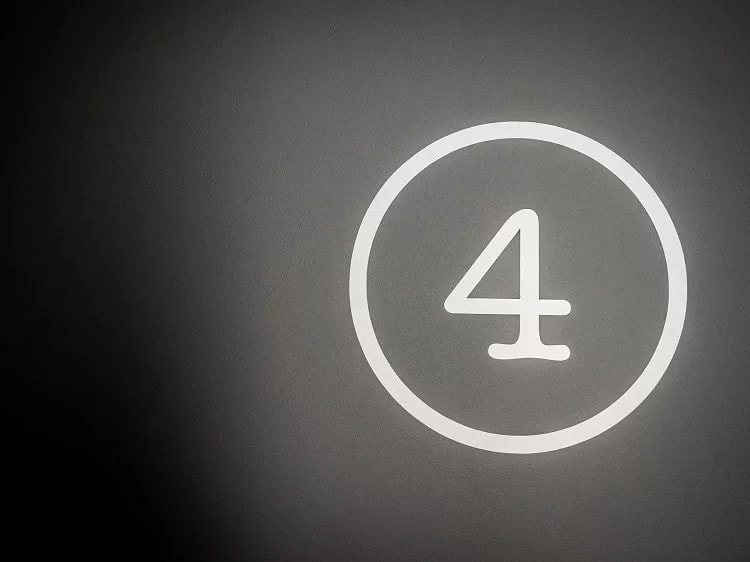Greetings, curious minds! Join me as we embark on a whimsical journey into the mysterious realm of numbers. As lots of non-Chinese individuals are fascinated by cultural quirks, they couldn’t help but delve into the perplexing aversion that the Chinese hold towards the number 4. Why is the number 4 taboo in China?
Buckle up for a thought-provoking adventure where we’ll unravel this intriguing phenomenon, sprinkled with a dash of wit and curiosity.
- The Sound of Misfortune: In the land of Mandarin, where tones shape meanings, I discovered a captivating overlap between the number 4 (sì) and the word for “death” (sǐ). It’s like a linguistic twister, where a seemingly harmless numeral conjures thoughts of mortality. This quirky coincidence lingers in conversations, adding an air of unease and an unexpected connection between everyday life and the afterlife.
- Skyscrapers Missing a Beat: I noticed a fascinating architectural oddity while exploring bustling Chinese cities. Some skyscrapers and buildings mysteriously omit floor numbers containing the dreaded digit. Imagine riding an elevator that leaps from the third floor to the fifth, creating a numerical black hole. It’s a playful and creative attempt to sidestep any potential gloomy vibes associated with the number 4, allowing Chinese high-rises to stand tall without tempting fate.
- Wedding Bells and Number Spells: Love, it seems, is not immune to the influence of numbers. In Chinese wedding traditions, couples meticulously avoid scheduling their special day on dates featuring the ominous number 4. Instead, they seek out the enchantment of “lucky” numbers like 8, associated with prosperity, or 9, believed to bring longevity. It’s like a numerical matchmaking dance, ensuring that the start of their journey together is brimming with harmony and good fortune.
- Not Just a Game of Mahjong: Even in recreational activities like mahjong, cherished by the Chinese, the number 4 holds significance. In this tile-based game, players adopt an intriguing rule—avoiding sets of four tiles. It’s a delicate dance to maintain the fine balance between luck and misfortune. The specter of a dreaded quartet looms, threatening to upset the celestial equilibrium of the game. Thus, caution prevails, and players strategically navigate the mahjong table.
And so, we reach the end of our whimsical exploration into the Chinese dislike for the number 4. As a Chinese, this cultural quirk has piqued my curiosity and deepened my appreciation for the unique nuances that shape our global tapestry. It reminds me that even numbers can carry symbolic weight and influence our daily lives in unexpected ways.
So, dear reader, let’s celebrate the vibrant diversity of cultures and the intriguing customs they hold. Remember, when conversing with Chinese friends, tread lightly around the infamous digit. May your own path be free from numerical mishaps and filled with a harmonious blend of luck, laughter, and an infinite array of numbers—minus the one that triggers an aversion!
In what culture is 4 a lucky number?
The number 4 is considered a lucky number in some cultures, most notably in Japanese culture. In Japan, the number 4 (shi) is associated with the word for “death” (shi), similar to the Chinese language. However, despite this linguistic connection, the Japanese have a different perspective on the number 4.
In Japanese, the number 4 can also be pronounced as “yon” or “shi,” and the pronunciation “yon” is preferred to avoid the association with death. As a result, the number 4 is often considered a lucky number in Japan, and it is sometimes associated with stability, balance, and good fortune. It is not uncommon to find the number 4 used in positive contexts in Japanese culture, such as in traditional ceremonies, lucky charms, or even in the design of products or company names.
FAQ: About the number 4 in Chinese culture
Yes, the number 5 is considered a lucky number in Chinese culture due to its association with balance, harmony, and the “Five Blessings” of longevity, wealth, health, virtue, and a peaceful death. It holds significant symbolism and is celebrated in various aspects of Chinese life.
Yes, the number 6 is considered a lucky number in Chinese culture. It is associated with smoothness, success, and prosperity due to its pronunciation, which sounds similar to the word for “wealth” (liú). The number 6 is often considered fortunate in business, relationships, and financial matters.
Yes, the number 8 is considered an extremely lucky number in Chinese culture. It is associated with wealth, prosperity, and good fortune. The pronunciation of the number 8 (bā) is similar to the word for “wealth” or “fortune” (fā). The number 8 is highly sought after in various aspects of Chinese life, including business, personal life, and even in choosing auspicious dates for important events. Its symmetrical shape is also seen as a symbol of balance and harmony.
In Chinese culture, the number 11 does not hold any specific traditional significance as a lucky number. Lucky numbers in Chinese culture are often associated with auspicious meanings based on pronunciation or cultural symbolism. However, it’s worth mentioning that individual interpretations and personal beliefs may vary, and some people might assign their own positive associations to the number 11.
While the number 12 does not hold specific significance as a lucky number in Chinese culture, it is worth noting that numbers derived from combining lucky numbers can also carry positive connotations. For instance, if the numbers 1 and 2 are considered lucky, the combination 12 might be seen as auspicious. However, in Chinese culture, the number 8 is more commonly associated with luck and prosperity.
In Chinese culture, the number 16 does not hold any specific traditional significance as a lucky number. However, it’s important to note that individual interpretations and beliefs can vary, and some people may associate personal meanings or symbolism with the number 16. Generally, numbers like 8 and 9 are more widely recognized as lucky numbers in Chinese culture due to their pronunciation and associations with wealth and longevity, respectively.
一 yī one.
二 èr. two.
三 sān. three.
四 sì four.
五 wǔ five.
六 liù six.
七 qī seven.
八 bā eight.

